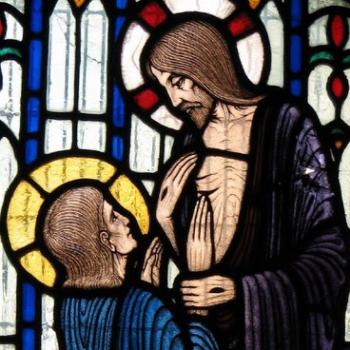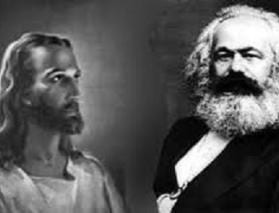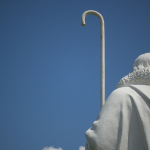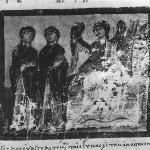As we continue to move toward “normalcy” after close to a year-and-a-half of pandemic shut down of various forms, I hear more and more often in the news about the problem of people who prefer to remain on government help rather than return to work. I do not claim to be fully informed about this dynamic, but it is certainly telling that the states most often reporting these problems are also states in which the pre-pandemic minimum wage was at a level well below any reasonable understanding of a a living wage. God forbid that people have to be paid a living wage in order to return to work. I would love to think that one of the positive things to result from the past many months might be a robust discussion of these and related issues, but I’m not holding my breath.
One of the most dynamic visions of a better world that I’ve ever read comes from Isaiah 65, a text that I read from the lectern when I the lector at church not long ago. It’s a beautiful text, a vision of a better world in which God is delighted with humanity and in which humanity is both functional, cooperative, and fulfilled. The prophet, speaking for God, announces that
I am about to create new heavens and a new earth; the former things shall not be remembered or come to mind. But be glad and rejoice forever in what I am creating; for I am about to create Jerusalem as a joy, and its people as a delight. I will rejoice in Jerusalem, and delight in my people; no more shall the sound of weeping be heard in it, or the cry of distress.

In the religious world of my youth, we understood such texts to be referring to a world to come, one that would be established after Jesus came back, the bad guys were defeated, and Jesus literally established heaven on earth. No wonder we were waiting expectantly for Jesus’ second coming. No wonder we sang songs like “this world is not my home, I’m just a-passin’ through; if heaven’s not my home, then Lord what will I do?”
But I’m convinced that the most important application of texts such as these is not waiting for a future world that is better than this one, but taking responsibility for seeking and striving to create that world now. In the gospels, Jesus regularly tells those listening, both then and now, that the kingdom of heaven is not simply a vision of the future. The kingdom of heaven is “within” and “among” us. The most important business of a person of faith is not just to parrot the line from the Lord’s Prayer asking that “thy kingdom come; thy will be done on earth as it is in heaven” as if this is someone else’s responsibility. Our task is to pursue and strive to establish this kingdom now, not as a future vision but as a present reality.
What would such a reality look like? Isaiah continues with some details of what follows when a new heaven and earth, established with joy and love, is pursued.
No more shall there be in it an infant that lives but a few days, or an old person who does not live out a lifetime; for one who dies at a hundred years will be considered a youth, and one who falls short of a hundred will be considered accursed.
Imagine a world in which all persons, from infancy to old age, have their basic needs met, a world in which no one suffers or dies from lack of basic necessities, sufficient food and shelter, or adequate health care.
They shall build houses and inhabit them; they shall plant vineyards and eat their fruit. They shall not build and another inhabit; they shall not plant and another eat; for like the days of a tree shall the days of my people be, and my chosen shall long enjoy the work of their hands.
Imagine a world in which adequate structures and systems are in place that will allow people to be self-sustaining and supporting. Imagine a world of sustainability and empowerment, a world in which the poor are not exploited by the rich, and the powerless are not exploited by the powerful.
There is no doubt that my current reading of this text has been influenced strongly by spending several classes not long ago with my students studying liberation theology. Liberation theology is energized, first and foremost, by the conviction that if the gospel has any meaning at all, it has meaning for this world now. I was taught that the gospel’s message of salvation was primarily, if not exclusively, about the state of my soul and what happens after I die. But if salvation is about liberating the oppressed, releasing the prisoners, and lifting up the downtrodden—which Jesus continually insists that it is—then given that we are surrounded by oppression, captivity, and disenfranchisement every day on every side, it is time to get to work. Isaiah’s prophetic vision may be of the future, but it is of a future that we are called to bring into the present.
Isaiah’s powerful text reminds me of a similarly beautiful passage four chapters earlier. Isaiah 61 is one of my favorite Biblical texts; I read it when family and friends scattered my father’s ashes in a meadow at the base of the Grand Tetons in Wyoming almost two decades ago.
The Spirit of the Lord God is upon Me,
Because the Lord has anointed Me
To preach good tidings to the poor;
He has sent Me to heal the brokenhearted,
To proclaim liberty to the captives,
And the opening of the prison to those who are bound . . .
To comfort all who mourn, to console those who mourn in Zion,
To give them beauty for ashes,
The oil of joy for mourning,
The garment of praise for the spirit of heaviness;
That they may be called trees of righteousness,
The planting of the Lord, that He may be glorified.
According to Luke’s gospel, this is the passage that Jesus read on a Sabbath day in his hometown Nazareth synagogue shortly after spending forty days of temptation in the desert, ending his reading with “Today this scripture is fulfilled in your hearing.” It was his official coming-out party, what some have identified as Jesus’ “mission statement.” He was almost killed on the spot for claiming to be the Messiah.
The stakes are high when we take the good news seriously. Seeking to create a better, more just world is always a threat to those most invested in resisting change. But if we are serious about following Jesus, we also have to be serious about our role in the divine economy. Incarnational faith means that human beings are the way that God gets into the world. If God’s kingdom is to be established, we don’t get to push it off to some future world to come. It’s time to get to work.

















